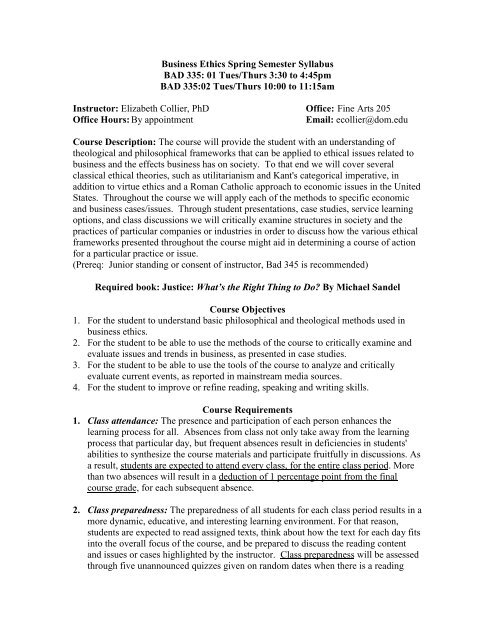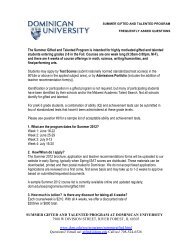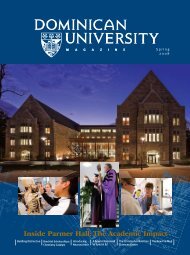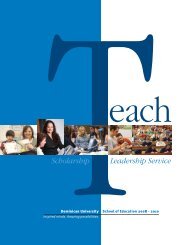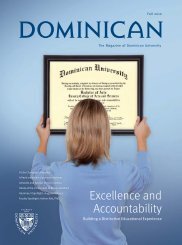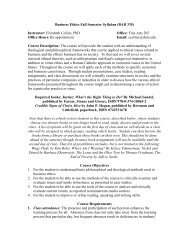Business Ethics Spring Semester Syllabus BAD 335: 01 Tues/Thurs ...
Business Ethics Spring Semester Syllabus BAD 335: 01 Tues/Thurs ...
Business Ethics Spring Semester Syllabus BAD 335: 01 Tues/Thurs ...
Create successful ePaper yourself
Turn your PDF publications into a flip-book with our unique Google optimized e-Paper software.
<strong>Business</strong> <strong>Ethics</strong> <strong>Spring</strong> <strong>Semester</strong> <strong>Syllabus</strong><br />
<strong>BAD</strong> <strong>335</strong>: <strong>01</strong> <strong>Tues</strong>/<strong>Thurs</strong> 3:30 to 4:45pm<br />
<strong>BAD</strong> <strong>335</strong>:02 <strong>Tues</strong>/<strong>Thurs</strong> 10:00 to 11:15am<br />
Instructor: Elizabeth Collier, PhD Office: Fine Arts 205<br />
Office Hours: By appointment Email: ecollier@dom.edu<br />
Course Description: The course will provide the student with an understanding of<br />
theological and philosophical frameworks that can be applied to ethical issues related to<br />
business and the effects business has on society. To that end we will cover several<br />
classical ethical theories, such as utilitarianism and Kant's categorical imperative, in<br />
addition to virtue ethics and a Roman Catholic approach to economic issues in the United<br />
States. Throughout the course we will apply each of the methods to specific economic<br />
and business cases/issues. Through student presentations, case studies, service learning<br />
options, and class discussions we will critically examine structures in society and the<br />
practices of particular companies or industries in order to discuss how the various ethical<br />
frameworks presented throughout the course might aid in determining a course of action<br />
for a particular practice or issue.<br />
(Prereq: Junior standing or consent of instructor, Bad 345 is recommended)<br />
Required book: Justice: What’s the Right Thing to Do? By Michael Sandel<br />
Course Objectives<br />
1. For the student to understand basic philosophical and theological methods used in<br />
business ethics.<br />
2. For the student to be able to use the methods of the course to critically examine and<br />
evaluate issues and trends in business, as presented in case studies.<br />
3. For the student to be able to use the tools of the course to analyze and critically<br />
evaluate current events, as reported in mainstream media sources.<br />
4. For the student to improve or refine reading, speaking and writing skills.<br />
Course Requirements<br />
1. Class attendance: The presence and participation of each person enhances the<br />
learning process for all. Absences from class not only take away from the learning<br />
process that particular day, but frequent absences result in deficiencies in students'<br />
abilities to synthesize the course materials and participate fruitfully in discussions. As<br />
a result, students are expected to attend every class, for the entire class period. More<br />
than two absences will result in a deduction of 1 percentage point from the final<br />
course grade, for each subsequent absence.<br />
2. Class preparedness: The preparedness of all students for each class period results in a<br />
more dynamic, educative, and interesting learning environment. For that reason,<br />
students are expected to read assigned texts, think about how the text for each day fits<br />
into the overall focus of the course, and be prepared to discuss the reading content<br />
and issues or cases highlighted by the instructor. Class preparedness will be assessed<br />
through five unannounced quizzes given on random dates when there is a reading
assignment. Each quiz will consist of one question to answer related to the reading for<br />
that particular day. Each quiz will be worth three points. The lowest quiz grade will<br />
be dropped. Quizzes will be administered at the beginning of the class period and<br />
cannot be made up at a later time or after class. The total points available toward the<br />
final grade for class preparedness is 12 points.<br />
3. Media Monitoring: Each student will choose one media outlet that reports on<br />
business-related matters to read/listen to/watch on a twice-weekly basis, in order to<br />
assess how ethical issues related to business are discussed in the public sphere. Three<br />
assignments relate to this media outlet: 1. Once during the semester each student will<br />
give a presentation of one issue their outlet reported and how they would resolve the<br />
ethical dilemma, given the methods of the course. An assignment sheet with further<br />
details can be found on Blackboard. The presentation is worth 10 points. 2. On ―case<br />
study‖ days, students will bring cases from their media outlet that can be applied to<br />
the method discussed that day and an outline of how they applied the method to that<br />
case. Students will be graded on three of the case study assignments. Each case study<br />
and outline will be worth 2 points total, for a grand total of 6 points toward the final<br />
grade. At the end of the semester each student will turn in a log of stories culled from<br />
the media outlet that relate to the course and to which the student can apply the<br />
method for that particular week. This log will give bibliographic information for the<br />
article/story, a corresponding ethical dilemma for that story, and indicate whether or<br />
not any of the methods we’ve discussed thus far could be used to resolve the issue.<br />
Each week students will monitor the media outlet twice, finding two stories each<br />
time, for a total of four entries each week. This log is worth 12 points toward the final<br />
grade, with six points earned at each of the two deadlines indicated on the syllabus.<br />
These elements of the course are worth a total of 28 points toward your final grade.<br />
4. Final Project: There are three options for the course final project. 1. Service<br />
Learning: Students have the opportunity to prepare tax returns for low income<br />
individuals in Cook County through an organization called ―Ladder Up.‖ The student<br />
will complete a two hour orientation, three Saturday mornings of service, three threepage<br />
reflections papers, and an end-of-the semester discussion. A more detailed<br />
assignment sheet will be posted on blackboard and deadlines are on the syllabus. 2.<br />
Book Reviews: Students will have the opportunity to read two books (Wage Theft in<br />
America by Kim Bobo and Where Am I Wearing? By Kelsey Timmerman), write two<br />
4-page reviews of the books, and prepare an information session/discussion with the<br />
rest of the class on the two books. A more detailed assignment sheet will be posted on<br />
blackboard and deadlines are on the syllabus. 3. Research Paper: The student will<br />
write a 10-page paper that utilizes one ethical method covered in the course to<br />
evaluate a specific ethical issue in a particular company or industry. The paper topic<br />
will be chosen in consultation with the instructor. The syllabus indicates progressive<br />
deadlines for the paper throughout the quarter. Meeting these deadlines on time<br />
contributes to the overall grade of the paper. A further instruction sheet for this<br />
assignment will be provided once the student chooses this option. The final project is<br />
worth 24 points toward the course grade.
5. Exams: There will two exams given on the dates indicated below. The first exam will<br />
cover the course materials assigned up to that point in the semester and the second<br />
exam will cover materials assigned after the first exam, up to the second exam. The<br />
second exam will be a take home exam. Further details will be given two weeks prior<br />
to each exam. The total points for these two exams toward the final grade will be 28.<br />
6. <strong>Business</strong> <strong>Ethics</strong> Essays: Students will write two short essays (approximately four<br />
pages each). A detailed assignment will be given on blackboard. The first essay will<br />
cover the student’s perception of the values in business and U.S. culture today. The<br />
second essay will cover the student’s determination of which methods of the course<br />
are most compelling for resolving ethical dilemmas and determining values in<br />
business. The first essay is worth 3 points and the second is worth 5 points toward the<br />
final grade.<br />
Course Grading<br />
The following indicates the breakdown of percentages for each area of the course that<br />
will contribute to your final grade:<br />
Quizzes: 12 points<br />
Media Outlet Log/Cases/Presentation: 28 points<br />
Two Exams: 28 points<br />
<strong>Business</strong> <strong>Ethics</strong> Essays: 8 points<br />
Final Project: 24 points<br />
-----------------------------------------------------------------<br />
Total Points: 100<br />
Grading Scale<br />
94-100 A 78-80 C<br />
92-93 A- 76-77 C-<br />
89-91 B+ 73-75 D+<br />
86-88 B 70-72 D<br />
84-85 B- 68-69 D-<br />
81-83 C+ 67 or below F<br />
Grade Definitions:<br />
An "A" indicates that a student has achieved the highest degree of accomplishment. It<br />
represents not only a mastery of the course materials, but also a significant degree of<br />
originality, creativity and/or critical application of the course materials.<br />
A "B" indicates academic achievement above average academic accomplishment,<br />
including some originality, creativity and/or critical application of the course materials.<br />
A "C" denotes that a student has completed all course requirements satisfactorily.
A "D" denotes that a student has a limited understanding of the course materials and<br />
meets the minimum requirements for passing the course.<br />
Failing indicates that a student has not completed the requirements of the course<br />
satisfactorily.<br />
Academic Integrity<br />
Please read the Academic Integrity Policy in the Student Handbook<br />
(www.thezonelive.com/zone/02_SchoolStructure/IL_DominicanUniversity-<br />
RiverForest/handbook.pdf). It describes violations of academic integrity, including<br />
plagiarism and cheating, noting that students who commit such violations are subject to<br />
sanctions such as (but not limited to) lowering a grade or failing the course. There are<br />
strong sanctions against plagiarism, which if a charge is proven, could result in an<br />
automatic "F" in the course or other sanctions. If you have any questions or doubts about<br />
what plagiarism entails or how to properly acknowledge source materials and the works<br />
of others, be sure to consult with the instructor. Proper citation procedures are provided in<br />
all standard writing manuals.<br />
Incompletes<br />
If a student believes that due to illness or other unforeseen, serious reasons, the<br />
coursework cannot be completed on schedule, he/she requests an incomplete from the<br />
instructor. It is up to the discretion of the instructor to grant or deny the request for an<br />
incomplete. Incompletes are not granted to students who procrastinate throughout the<br />
quarter and are unable to complete the course requirements on time. The follow<br />
guidelines are used for incompletes at Dominican:<br />
1. The grade of ―incomplete‖ may be given to a student who has done work of a passing<br />
grade in a course but who has not completed that work.<br />
2. Incompletes awarded at the end of the Fall or Summer semesters must be removed by<br />
the end of the subsequent semester.<br />
3. Incompletes awarded at the end of <strong>Spring</strong> semester must be removed by the end of<br />
the subsequent Fall semester.<br />
4. At the end of the prescribed time lines, professors may report a letter grade (A – F) or<br />
an NC (No Credit). The NC grade does not affect the student’s Grade Point Average.<br />
5. If a professor does not submit a grade by the end of the following semester, the<br />
Registrar will automatically record a grade of ―F.‖<br />
6. In an exceptional case, a professor may petition the Dean of the Rosary College of<br />
Arts and Sciences for permission to extend the incomplete for another semester. This<br />
must be done before the end of the last week of classes of the semester when the<br />
grade is due.<br />
It is up to the student to monitor the deadline for completing an incomplete. The student<br />
should maintain communication with the instructor so the instructor is aware that the<br />
student intends to finish the coursework and that the student does so in a timely fashion,<br />
leaving the instructor enough time to grade the remaining work and submit the paperwork<br />
prior to the deadline. The responsibility for these deadlines and this communication lies<br />
entirely with the student. Note: In the case of a student who has applied for graduation
and who has been approved for an Incomplete in his or her final term, the incomplete<br />
must be resolved within the four-week grace period before final degree certification.<br />
Instructor Availability Outside of Class<br />
Please email (ecollier@dom.edu) or speak to Dr. Collier ahead of time to schedule an<br />
appointment if you wish to meet outside of class. Dr. Collier is generally available on<br />
<strong>Tues</strong>days and <strong>Thurs</strong>days throughout the day and evening, however every effort will be<br />
made to accommodate student schedules for necessary meetings on other days. Face to<br />
face communication is preferred whenever possible. Email is to be used for general<br />
communication such as absence due to unforeseen circumstances, clarification of an<br />
assignment or requesting an appointment. Email is not appropriate for requesting<br />
incompletes, discussing ramifications of multiple absences/tardiness, or grade-related<br />
discussions. When communicating via email, please allow 24 hours for a response.<br />
The official syllabus is open to revision and is on Blackboard.<br />
<strong>Thurs</strong> Jan 14: Overview of Course<br />
<strong>Tues</strong> Jan 19: Media Outlet Decisions Due<br />
Service Learning/Research Paper/Book Review Decision<br />
<strong>Business</strong> <strong>Ethics</strong> Essay #1<br />
<strong>Thurs</strong> Jan 21: Introduction to Thinking Methodologically<br />
Read Sandel, Chapter 1 ―Doing the Right Thing‖<br />
Research Paper General Topic Due<br />
Service Learning Sign-Up Completion<br />
Book Review Assignments Given<br />
<strong>Tues</strong> Jan 26: Methodology #1: Utilitarianism<br />
Read Sandel, Chapter 2<br />
Begin Media Log<br />
<strong>Thurs</strong> Jan 28: Students bring in Case for/Example of Utilitarianism<br />
(Case Study #1)<br />
Research Paper Specific Topic Due in Class<br />
Service Learning Progress Report Due in Class<br />
(Last Day to Drop Class)<br />
<strong>Tues</strong> Feb 2: Methodology #2: Libertarianism<br />
Read Sandel, Chapter 3<br />
<strong>Thurs</strong> Feb 4: Students bring in Case for Libertarianism<br />
(Case Study #2)<br />
Essay #1 Due for Service Learning Students
<strong>Tues</strong> Feb 9: Read Sandel, Chapter 4 ―Markets and Morals‖<br />
Book Review #1 Due<br />
<strong>Thurs</strong> Feb 11: Methodology #3: Kant<br />
Read Sandel, Chapter 5<br />
Sign-up for Media Presentation Dates<br />
Media Log Deadline #1—email to instructor<br />
<strong>Tues</strong> Feb 16: Students bring in Case for Kant (Case Study #3)<br />
Research Paper Bibliography Due in Class<br />
<strong>Thurs</strong> Feb 18: Methodology #4: Rawls<br />
Read Sandel, Chapter 6<br />
<strong>Tues</strong> Feb 23: Students bring in Case for Rawls (Case Study #4)<br />
<strong>Thurs</strong> Feb 25: Read Sandel, Chapter 7 ―Arguing Affirmative Action‖<br />
Service Learning Essay #2 Due in Class<br />
<strong>Tues</strong> Mar 2: Exam #1<br />
<strong>Thurs</strong> Mar 4: In-Class Service Learning Reflection<br />
In-Class Research Paper Tutorial<br />
<strong>Tues</strong> Mar 9: <strong>Spring</strong> Break<br />
<strong>Thurs</strong> Mar 11: <strong>Spring</strong> Break<br />
<strong>Tues</strong> Mar 16: Media Presentations Begin (4)<br />
<strong>Thurs</strong> Mar 18: Methodology #4—Virtue <strong>Ethics</strong> Part I<br />
Read Sandel, Chapter 8<br />
3 Media Presentations<br />
Research Paper Outlines Due in Class<br />
Book Review #2 Due<br />
<strong>Tues</strong> Mar 23: Virtue <strong>Ethics</strong> Part II<br />
Link to Reading on Blackboard<br />
4 Media Presentations<br />
<strong>Thurs</strong> Mar 25: Students bring in case studies for virtue ethics<br />
Case Study #5<br />
3 Media Presentations<br />
<strong>Tues</strong> Mar 30: Sandel, Chapter 9 ―What do we owe one another?‖
3 Media Presentations<br />
<strong>Thurs</strong> April 1: Holy <strong>Thurs</strong>day—No Class<br />
<strong>Tues</strong> April 6: Sandel, Chapter 10 ―Justice and the Common Good‖<br />
Service Learning Essay #3 Due in Class<br />
Deadline for Making Appointment with Rough Draft at Writing<br />
Center<br />
Book Review #3 Due<br />
4 Media Presentations<br />
<strong>Thurs</strong> April 8: Methodology #5: Catholic Social Thought Part I<br />
Reading detailed on blackboard<br />
Rough Drafts Due in Class<br />
Service Learning Reflection in Class<br />
3 Media Presentations<br />
<strong>Tues</strong> April 13: Catholic Social Thought Part II<br />
Reading detailed on blackboard<br />
<strong>Thurs</strong> April 15: Book Review Discussion Preparation Day<br />
Service Learning Discussion Preparation Day<br />
Media Log Deadline #2—Email by midnight<br />
<strong>Tues</strong> April 20: Service Learning Discussion Day (All Students Attend)<br />
Service Learning Essay #4 Due<br />
2 Media Presentations<br />
<strong>Thurs</strong> April 22: Exam #2: Take home exam due in class<br />
Book Review Discussion Day (All Students Attend)<br />
Final Drafts of Research Paper Due in Class<br />
<strong>Tues</strong> April 27: Book Review Discussion Day (All Students Attend)<br />
<strong>Thurs</strong> April 29: Research Paper Discussion Day (All Students Attend)<br />
<strong>Tues</strong> May 4: Research Paper Discussion Day (All Students Attend)<br />
<strong>Thurs</strong> May 6: Course Wrap-Up<br />
<strong>Business</strong> <strong>Ethics</strong> Essay #2


